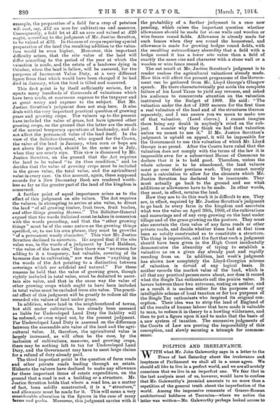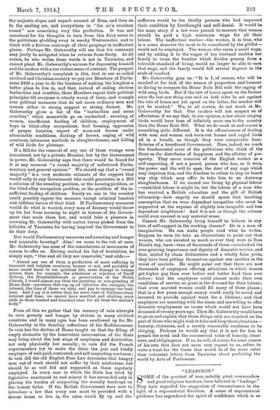POLITICS AND IRRELEVANCE.
WITH what Mr. John Galsworthy says in a letter to the Times of last Saturday about the irrelevance and ineptness of Parliament we shall all in a sense agree. We should elflike to live in a perfect world, and we are allacutely conscious that we live in en imperfect one. We fe'ar that in the last analysis most of us, however, would have to confess that Mr. Gralsworthy's jeremiad amounts to no more than a repetition of the general truth about the imperfection of the world. Among the impressive remnants of Graeco-Roman architectural boldness at Taormina—where we notice the letter was written—Mr. Galsworthy perhaps looked across to
the majestic slopes and superb summit of Etna, and then on
to the smiling sea, and everywhere in "the air's cerulean round" saw something very like perfection. It was not unnatural for his thoughts to turn from this fairy scene to the politicians plodding away in smoky Westminster, and to think with a furious contempt of their gropings in ineffectual gloom. Perhaps Mr. Galswortby will see that his contempt may justly be mitigated when he returns from Sicily. At all events, he who writes these words is not in Taormina, and cannot plead Mr. Galsworthy's excuses for depressing himself and his readers with a too violent sense of contrast. The purport of Mr. Galsworthy's complaint is this, that in our so-called civilized and Christian country we pay our Members of Parlia- ment £400 a year to do the business of making the kingdom a better place to live in, and that, instead of ending obvious barbarities and cruelties, these Members repeat their political principles till everyone is utterly weary of them, and wrangle over political measures that do not move ordinary men and women either to strong support or strong dissent. Mr. Galsworthy gives a list of the "barbarities and mean cruelties" which meanwhile go on unchecked : sweating of women, insufficient feeding of children, employment of boys in blind-alley occupations, foul housing, oppression of pauper lunatics, export of worn-out horses under abominable conditions, docking of horses, caging of wild creatures, inhumane methods in slaughterhouses, and killing of wild birds for plumage.
If a Bill for the removal of any one of these wrongs were introduced, not by a private Member, but by the Government in power, Mr. Galsworthy says that there would be found for it at any moment "a round majority of unfettered Parlia- mentary and general opinion." We should say that a "round majority" is a very moderate estimate of the support that would rally to any Government who could guarantee in a Bill a solution of the sweating problem, or the housing problem, or the blind-alley occupation problem, or the problem of the in- sufficient feeding of children. Surely no one in the country could possibly oppose the measure except criminal lunatics and ruthless haters of their kind. If Parliamentary measures would do what is wanted, every man of decency would throw up his hat from morning to night in honour of the Govern- ment that made them law, and would take a pleasure in crowning Mr. Galeworthy with cactus leaves picked from the hillsides of Taormina for having inspired the Government to do their duty.
But would Parliamentary measures end sweating and hunger and miserable housing? Alas! we come to the rub at once. Galsworlhy has none of the consolations or assurances of reason to offer us. Having recited his list of brutalities, he simply says, "One and all they are removable," and adds:—
" Almost any one of them is productive of more suffering to innocent and helpless creatures, human or not, and probably of more secret harm to our spiritual life, more damage to human nature, than, for example, the admission or rejection of Tariff Reform, the Disestablishment or preservation of the Welsh Church, I would almost say than the granting or non-granting of Home Rule—questions that sop up ad infinitum the energies, the interest, the time of those we elect and pay to manage our busi- ness. And I say it is rotten that, for mere want of Parliamentary interest and time, we cannot have manifest and stinking sores such as these treated and banished once for all from the nation's body."
From all this we gather that the memory of vain attempts to cure poverty and hunger by statute in many civilized countries and in many ages has been swallowed up for Mr. Galeworthy in the dazzling reflections of the Mediterranean. In vain has the decline of Rome taught us that the filling of empty stomachs by the benevolent intervention of the State may bring about the last stage of emptiness and destitution, not only physically but morally ; in vain did the French experimenters try to make the State the just and kindly employer of well-paid, contented, and self-respecting workmen; in vain did the old English Poor Law determine that hungry men out of work should not suffer by their misfortune, but should be as well fed and supported as those regularly employed. In every case in which the State has tried by legislative enactment to end misery it has succeeded only in placing the burden of supporting the morally bankrupt on the honest toiler. If the British Government were now to introduce a law that every one most be provided with a decent house to live in, the rates would fly up and the sufferers would be the thrifty persons who had improved their condition by forethought and self-denial. It would be the same story if a law were passed to-morrow that women should be paid a high minimum wage for all their labour. The ineffectual worker—the worker, it is true, who in a sense deserves the most to be considered by the pitiful— would not he employed. The woman who earns a small wage, and by adding it to the wages of her husband enables her family to cross the frontier which divides penury from a tolerable standard of living, would no longer be able to earn that wage, and the family would fall several degrees in the scale of comfort.
Mr. Galsworthy goes on : "It is I, of course, who will be mocked at for lack of the senses of proportion and humour in daring to compare the Home Rule Bill with the caging of wild song birds. But if the tale of hours spent on the former since the last new thing was said on both sides be set against the tale of hours not yet spent on the latter, the mocker will yet be mocked." We, at all events, do not mock at Mr. Galsworthy for that. Our readers will not suspect us of affectation if we say that, in our opinion, a law about singing birds would have been of infinitely more use to the country than the Home Rule Bill. What we do mock at and resent is something quite different. It is the offensiveness of dealing with men and women and worn-out horses and caged birds all in a breath, as though they were comparable bene- ficiaries of a beneficent Government. Here, indeed, we reach the fundamental error of the politicians who think of the State as the distributor of happiness and the allotter of pro- sperity. They never conceive of the English worker as a self-respecting, if not a proud, person who has, as it were, the power and the will to open the door of any cage which may imprison him, and the freedom to refuse to step on board any ship which may offer to take him to an Antwerp slaughterhouse. If we earned our living by physical labour —unskilled labour it might be, but the labour of a man who has received a British education and the gift of British citizenship—how angrily we should spurn that insulting assumption that we were dependent incapables who must be supported at the expense of slightly less incapable and less dependent neighbours! And it is not as though the scheme could even succeed in any material sense.
Cannot Mr. Galsworthy bring himself to believe in any love of self-support in the working classes P He is a man of imagination. He can make people read what be writes. Suppose he were (to take an illustration) to point out that women, who are sweated as much as ever they were in Tom Hood's day, have—tens of thousands of them—overlooked the ever-growing importance and dignity of domestic service, and that, misled by sham distinctions and a wholly false pride, they have been pitting themselves against one another in the worst of markets. He might point out that there are now thousands of employers offering situations in which women get higher pay than ever before and better food than over before ; that the employees could almost make their own conditions of service, so great is the demand for their labour; that even married women could fill many of these places ; that in a few years enough money could easily be saved and invested to provide against want for a lifetime; and that employers are marching with the times and are willing to offer domestic employment on terms which would not have been dreamed of twenty years ago. Then Mr. Galsworthy would have to go on and explain that three things only arc required on the part of those who might wish to take and keep these situations — honesty, cleanness, and a merely reasonable readiness to be obliging. Perhaps he would say that it is not for him to preach the need and the commercial value of honesty, clean- ness, and obligingness. If so, he will, of course for some reason of his own that does not seem very cogent to ns, refuse to write a tract for the times that would be of far more value than vehement letters from Taormina about perfecting the world by Acts of Parliament.















































 Previous page
Previous page